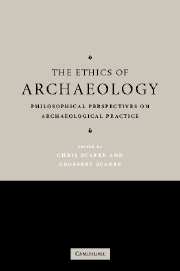Book contents
- Frontmatter
- Contents
- List of contributors
- Acknowledgements
- 1 Introduction
- PART I THE OWNERSHIP OF CULTURAL OBJECTS
- PART II ARCHAEOLOGISTS AND THE LIVING
- 6 Human subjects review and archaeology: a view from Indian country
- 7 Trust and archaeological practice: towards a framework of Virtue Ethics
- 8 Truthfulness and ‘inclusion’ in archaeology
- 9 Ethics and Native American reburials: a philosopher's view of two decades of NAGPRA
- 10 Stewardship gone astray? Ethics and the SAA
- PART III ARCHAEOLOGISTS AND THE DEAD
- PART IV THE COMMON HERITAGE OF HUMANKIND?
- References
- Index
6 - Human subjects review and archaeology: a view from Indian country
Published online by Cambridge University Press: 05 June 2012
- Frontmatter
- Contents
- List of contributors
- Acknowledgements
- 1 Introduction
- PART I THE OWNERSHIP OF CULTURAL OBJECTS
- PART II ARCHAEOLOGISTS AND THE LIVING
- 6 Human subjects review and archaeology: a view from Indian country
- 7 Trust and archaeological practice: towards a framework of Virtue Ethics
- 8 Truthfulness and ‘inclusion’ in archaeology
- 9 Ethics and Native American reburials: a philosopher's view of two decades of NAGPRA
- 10 Stewardship gone astray? Ethics and the SAA
- PART III ARCHAEOLOGISTS AND THE DEAD
- PART IV THE COMMON HERITAGE OF HUMANKIND?
- References
- Index
Summary
Into each life, it is said, some rain must fall, some people have bad horoscopes, others take tips on the stock market. But Indians have been cursed above all people in history. Indians have anthropologists.
Vine Deloria, Jr. (Standing Rock Sioux) Custer Died for Your Sins (1969)Many Native Americans view anthropologists as a curse, as people who are not to be trusted, people with ulterior motives, people who steal culture, language, images and things (Deloria 1992, 1995, 1999; Thornton 1998; Watkins 2000b; White Deer 1997). This view stems from the historic relationships that have provided anthropologists, university professors, museum professionals, art dealers and antiques dealers with livelihoods often to the detriment of Native people and communities.
There are a number of unfortunate tensions inherent in the longstanding relationship between Native peoples and anthropologists. Anthropologists generally express feelings of affection and affinity for indigenous cultures and most approach their work with a desire to benefit their host communities. Despite these good intentions, however, great harm has often been brought to indigenous communities who did not agree with or fully understand the goals, methods or long-term ramifications of participation in anthropological studies. In addition to the divergent interests of the host community and the anthropologist's career interests, there are additional tensions between paternalism and community autonomy. These arise as a result of differing conceptions of what constitutes benefit for a host community.
- Type
- Chapter
- Information
- The Ethics of ArchaeologyPhilosophical Perspectives on Archaeological Practice, pp. 97 - 114Publisher: Cambridge University PressPrint publication year: 2006
- 15
- Cited by



